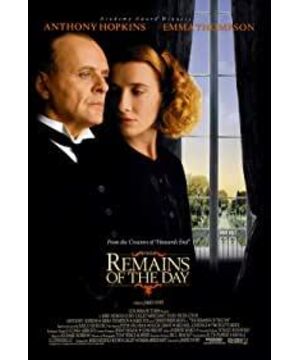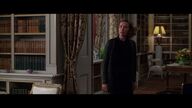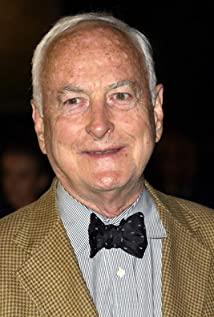Kazuo Ishiguro won the Nobel Prize, and his work suddenly entered our field of vision. The Nobel Prize for Literature has always had such a function: to bring excellent works that were originally unfamiliar to the public to the fore, and then to trigger a enthusiastic reading trend. The award of Bob Dylan last year also directly promoted the translation and introduction of his works in my country, and pointed out a new dimension for the global contemporary literary definition. "THE REMAINS OF THE DAY" (THE REMAINS OF THE DAY) is one of Ishiguro's masterpieces. This novel was adapted into a movie in 1993. I personally prefer the translation of "Long Days to Exhaust", etc., because the widely accepted translation of "Farewell to You Qing Tian" has too many limitations to show the audience. Brings a complete movie-watching expectation, so when watching a movie, many people may focus their attention on the narrow point of "emotion", thus losing their grasp of the complete connotation of the movie. In my opinion, the sadistic and restrained feelings between the heroes and heroines are just a clear line to narrate the story. Behind this feeling there is a vein of social and political changes that looms faintly and runs through the whole movie. And this faintly undulating context tells the profound meaning of this movie. This film review will be very long. It is strongly recommended that you watch this film review again after watching the movie, because the following analysis may be too detailed, so that it is seriously spoiled, which will destroy the ignorance of everyone when watching movies in the future. Pleasure. Then, the following Xiao Ba will begin to show off his profound, sharp and long writing style. It is said that every reader who can read Xiao Ba's article is true love. A British nobility and stewardship culture
The European structure and German national sentiment after the Second World War and the First World War
Three feelings of shame: Darlington and the British policy of connivance towards Germany
Four conflicts between democratic consciousness and elite thinking
Five reasons for losing love: Stevens' self-abstinence?
Six Realities and Passions: Miss Kenton’s Two Painful Choices
Seven Darlington Houses Change Ownership: Lewis and the Entry of American Culture
Eight Metaphors: Portraits of the IV Earl of Pembroke
Nine long day will do: And you can not rewind my life a British aristocratic butler and culture "Aristocracy" is a very dazzling term in the ancient history and culture of Europe. It not only represents blood, status and power, but also has profound moral personality. When the aristocratic politics of the European countries collapsed due to the revolution and the First World War, Britain retained her monarchy, and the aristocracy still played an important role in Britain. The reason why the British aristocratic culture can survive the violent turmoil is that, on the one hand, the United Kingdom is an island country floating out of the European continent, and the British people are less affected by the European social trends; on the other hand, it is because the United Kingdom is politically The long-term conservatism tends to make its social structure more stable. Therefore, we can say that the British aristocratic culture is deeply rooted. The so-called nobility means not only enjoying material wealth and dignity in rights, but also pursuing moral dignity and honor. For true nobles, honor is often more important than material. If a nobleman wants to fight for noble honor, he needs a large number of servants to serve his worldly life. Therefore, stewardship came into being and the stewardship culture was born from this. Stewardship is subordinate to the nobles, so stewardship culture also belongs to noble culture; noble culture is freedom and enterprising, but stewardship culture is obedience and restraint, and must conform to the aristocratic temperament as much as possible in terms of morality and taste. The so-called "people are like their home", the noble temperament of the nobles should also be reflected in their family behavior, and servants are also part of their family. We Chinese say that "you must look at the master when you hit a dog," because hitting someone else's slave will also hurt the face of the master. As we have seen in the movie, the old Stevens dedicated his life to the profession of butlers. Stevens also aspired to be an excellent butler, and he was indeed one of the best butlers in the UK at the time. , This can be seen from the status of Darlington House. All of Stevens' behavior conforms to the housekeeper's norms, being calm, restraining emotions, obeying the master, and elegant speech and demeanor, so the servility of the housekeeper is completely added to Stevens. Our Chinese "Shi Shuo Xin Yu" can also be called an ancient textbook of behavior norms in our country. These behavior norms are elegant and noble if learned by masters, and slaves if they are learned by slaves. Why? Because their social class is there. Only by sacrificing their freedom can the slaves gain the freedom of the master. Although the society Stevens lived in was not a slave society for a long time, the employment relationship between him and Darlington was actually a master-slave relationship. When the thing that has been scolded in history disappears, people still have a demand for this thing, so this demand becomes a profession. And the nature of this profession is actually related to The essence of things that have disappeared is the same. Stevens took this career as a lifelong pursuit and had to sacrifice. two, A war, a pattern of post-war Europe and the German national sentiment of World War I in the final analysis into the group of the old imperial acquisitiveness industrial society battle sites of the world, neither morality. As a result, the major European empires collapsed, the feudal system finally came to an end, the social politics of various countries advanced towards democracy in ruins, and the national consciousness gradually rose. As a defeated country, Germany received extremely severe sanctions, its social economy was in a slump, and a democratic government was unable to play a role in reconstruction. Populist ideology and nationalist sentiments spread in the hearts of every German. Therefore, after the Versailles contract, far-sighted politicians said: "This is not peace, this is just a truce of twenty years." Bitter fruit. So, with the cheers of the German people, the Nazis (National Socialist Party) came to power. In the movie, we can see a section that says: "German workers do not go on strike, while the English guild movement is very troublesome." Why do German workers not strike? Because they are well aware that the suffering of their nation mainly comes from external pressure. 3. Feeling guilty: Darlington and Britain's policy of connivance towards Germany
Darlington’s sympathy for Germany is certainly not just because of the grief and suicide of his German friends, but to be precise, because his noble sentiments as a nobleman made him well aware that the sanctions imposed on Germany by the victorious countries are unfair. Darlington believes that a peaceful environment that puts Germany in hardship is not true peace. It is wrong whether it is morally speaking or an ideal international political situation. So what kind of Germany fits his vision, and what is his vision? His vision is a balance of power on the European continent. Britain’s long-term European policy has been "balance of power." Traditional British people believe that only European countries have a balanced power that will not endanger Britain's survival. Therefore, rebuilding Germany as soon as possible and restoring its armaments will not only help maintain the balance of power on the continent, but also stop the socialist revolution in the European Union and restrain Soviet Russia. Darlington's ideas were consistent with the mainstream of the British government at that time, so he frequently showed good wishes to Germany and was committed to Germany's recovery. The meetings held in his home and the views put forward at the meetings also represent the main views of the British government. Some of the battles that occurred during this period, such as the objections put forward by American Lewis, also exist in reality. However, the views represented by this figure of Lewis must not be regarded as American views, because the United States was still the mainstream of conservative ideas of "continental isolationism". Pushing to the League of Nations and participating in international affairs, his proposal was rejected. The characterization of Lewis is actually not good, because the hidden meaning of this character is too deep, he is more like a driving factor used to show a certain metaphor. As for the Duke of Darlington himself, as Lewis said, he is a classic English gentleman, decent and noble, but an amateur politician. Darlington has a very good moral training, but like many self-proclaimed noble gentlemen, he is too easy to be deceived by exquisite and noble lies, unable to implement it into the real reality. There is a saying in China called "The things of the world are destroyed by the villain, one or two; those who are destroyed by the incomprehensible gentleman, nine out of ten." No matter where they are, there are many such gentlemen. But is such a gentleman, or a good person like Darlington, really wrong? No, as we saw in the movie, when Darlington made Germany increasingly mad because of his own policies, he often had trouble sleeping at night, extremely painful, and extremely self-blaming. What he hoped was peace, but the result was to push Europe into war step by step. Perhaps everyone has also noticed the plot of Darlington’s dismissal of two Jewish refugee girls. Perhaps everyone will think that Darlington is really a Nazi lord here. Righteous, but please don’t forget that the German government borrowed the rhetoric of "Judas harmed Christ" and "the essence of the Jews." In the long history of Europe, anti-Semitism has never stopped, and Shakespeare is also anti-Semitism. His "The Merchant of Venice" is an example. Of course, anti-Semitism is not good, and we must respect the right of anyone on earth to survive. Darlington is tragic, and his tragedy is actually a human tragedy. The real tragedy often lies in the fact that everyone’s starting point is the pursuit of good, but the result is a conflict between various good, and it is irreconcilable. Is Darlington a patriot or a traitor? I am afraid that Zhu Jun also secretly has an answer in his heart. 4. The struggle between democratic consciousness and elite thinking Here I am going to knock on the blackboard and draw the key points! In the movie, there are four main plots of "the struggle between democratic consciousness and elite thinking" in which Stevens participated: 1. Spencer's three questions to Stevens by the fireplace; 2. Listening to the inn. The young man Smith talked about politics and diplomacy; 3. A conversation with Richard Carlisle when he was refueling the car. 4. On the night that Darlington secretly met with the Prime Minister and German ambassador, Stevens had a conversation with Darlington’s godson Cardinal, who was a journalist. In the first episode, Stevens couldn't answer Spencer's three questions about international politics and economy. Of course, he never paid attention. So Spencer came to the conclusion: Democracy is nonsense, and real national decisions must be carried out by the elites. The name "Spencer" can be described as a revelation in the United Kingdom. The famous Herbert Spencer, as a pioneer of social Darwinism, has a huge influence all over the world. In the second episode, Smith made an objective evaluation of Churchill, and we can also notice his enthusiasm for current affairs. The third plot followed the second. When Carlisle learned that Stevens was the notorious butler of Darlington, he asked him a series of questions. The connotation of this plot is very rich. First of all, it represents people's discussion of historical figures: Duke Darlington is a politician who made serious mistakes, even a traitor, but he is really a good man. Secondly, it represents the torture of later generations to people who were in the political turmoil at that time: Do you agree with him? Did you do something wrong? Finally, together with the previous episode, it represents the general concern of the lower classes in the UK for politics. In the fourth episode, Cardinal wanted to get some information about Darlington's late night meeting from Stevens, but Stevens said that he only cared about his work. Cardinal cares about the fate of the country and Darlington, but he regrets Stevens. Later, Cardinal died on the battlefield. These four episodes show us the attitudes and changes of the lower classes of the British people towards politics, and have seen the people's democratic consciousness have been greatly improved. Stevens represents the attitude of his generation towards the politics of the "upper class": the master must have made wise decisions and considerations. Cardinal, Smith, and Carlisle showed the advancement of democracy. Democracy is a kind of responsibility. When people lack the concern and judgment of politics, democracy is just empty talk. Although elite politics is the best choice among social groups, it may not be able to make correct decisions. Only when people are aware of their current rights can they grasp their own freedom and destiny. But how easy is it to control one's own freedom and destiny? This puts forward demands on the social environment. Stevens and even his generation were not born ignorant of democratic consciousness, but the background of the time prevented them from participating in the political life of the country. Life was their greatest pursuit at that time. Participate in the political life of the country. Life was their greatest pursuit at that time. Participate in the political life of the country. Life was their greatest pursuit at that time. 5. Why did you lose love: Stevens' self-abstinence?
As described in the butler culture in the first section, Stevens's professional requirements will inevitably lead to his self-abstinence, and love will distract him at work. Therefore, he never hired a beautiful maid, and even held a consistent indifferent attitude towards Miss Kenton. He is not indifferent to beauty and women, but is too clear about the calmness required to maintain his career. The job at Darlington House was the pinnacle of his career, and he didn't want to lose it. And if he wants to have a family, he may not be able to do a perfect job. What's more, his master Darlington was also a single nobleman. Did Stevens really have no interest in Miss Kenton? Of course there were, and regretted Miss Kenton's departure for life. When we saw the section where Miss Kenton snatched the book from Stevens's arms, it was really embarrassing for Stevens's Liu Xia Huifeng. The plot is completely different from the movie we usually watch! Why don't you come here? A kiss? Stevens was probably extremely excited at the time, but he just couldn't get his hands off, so he had to stand still, without making a gesture or saying a word, just like an iron pillar, motionless. Why? Because the long-term lifestyle and ideas have made Stevens lose the courage to love, he is afraid to face it all. Under his calm and determined appearance, there is a heart that has been imprisoned for a long time. What is his heart imprisoned? All the realistic butler culture concepts accepted by him. These ideas are truths to him, and these truths exert power on him, tightly suppressing his freedom and passions. The freedom that people feel most strongly about sex may be the freedom of lust. And this freedom of lust will eventually be imprisoned in the face of power. This may be why every time human thought changes, the requirements of lust are expressed first. In Europe, there are from the Renaissance to the Enlightenment to the religious reform; in China there are the middle and late Ming Dynasty and the May Fourth Movement. In short, Stevens' self-abstinence is the product of society, the reality of society at that time and all the thoughts and concepts. Stevens's personality is deformed, and we can also see a bit of cruelty in British society at that time. 6. Reality and passion: Miss Kenton's two painful choices
I think the characterization of Miss Kenton is the best and most flesh-and-blood in the whole movie. Miss Kenton has also been engaged in the business of housekeepers for a long time. However, perhaps because of the more perceptual thinking of women themselves, the Miss Kenton we have seen is very charming, which is different from Stevens's strict adherence to rigidity. The reason why Miss Kenton is a housekeeper is not like Stevens' pursuit of professional ideals. She is to make a living and find a job. In the same way, she left because she wanted to live. She couldn't stay with Stevens. You are the butler, and I am the butler. You have a good relationship with each other, but I don't know how to live this way. Miss Kenton represented a social conscience. When the two Jewish maids were about to be fired, she also resolutely stated that she would resign accordingly. However, she has to live if she is a person. In her own reality, she has to admit that she is a coward. Who is not a coward? Isn't Stevens a coward? He is the weakest one. Miss Kenton undoubtedly wanted a family where she could stabilize herself and someone could rely on. She also wanted to rely on Stevens, but Stevens was cold, and he put on a cold ass every time he was courteous. So, although she liked it very much, Miss Kenton knew that Stevens was not her target, and he could not give her what she wanted-love and marriage. Therefore, after weighing in love and hatred, Kenton chose to accept Mr. Bain's proposal. It can be seen from Mr. Bain, who decided to stop being a housekeeper and go to business, and the deputy housekeeper who married and left the maid. Being a good housekeeper usually means being single, and employers may not hire a housekeeper with a family. So, what would Miss Kenton think when she did not get a response for the provocative behavior of stealing the book in Stevens's arms? The background of Miss Kenton's second decision was actually when she and Stevens were most likely to be together. The elderly Stevens drove to the west of England to find her because of a letter from Miss Kenton, and wanted to take her back to Darlington House; and Miss Kenton also obviously hoped to rehabilitate with Stevens, because she Mr. Bain was unhappy and divorced for a long time. Mr. Bain's business is probably not doing very well. I feel this when he meets with Miss Kenton in embarrassment. But the conversation between Mr. Bain and Miss Kenton directly ended all the possibilities between Miss Kenton and Stevens: their daughter was pregnant and needed care. In this way, the conflict between reality and passion broke out again, and in the end, passion lost to reality. On such a rainy night, with such a black umbrella, the two of them had to stage a farewell story in this life. But this is real life! How many lovers because of this or that The reason cannot stay together forever, and sincere feelings can only be kept deep in my heart forever, buried in silence. Although the relationship between Stevens and Miss Kenton has always been firmly suppressed, isn't the reality that firmly suppresses us in this way? The following dialogue between Miss Kenton and the maid who was about to resign and get married was very shocking to her: "Charlie and I are getting married." "Have you considered it carefully?" "Yes, Miss Kenton." "You are here." Do it better, and have a bright future." "Charlie and I are going to get married, Charlie and me." "But I, I know how I should tell you, I have seen many such things, young ladies are eager to get married , And ended indifferently. Do you have money?" "We don't have money, but we don't care." "You will gradually know how difficult it is to live a poor life." "But we have each other. A partner?" This dialogue tells the attitude of Miss Kenton and most people facing real life, and also tells the truth of life through the mouth of a maid. 7. Darlington House changed hands: Lewis and the presence of American culture. When Lewis came to Darlington House before World War II, he was a realist politician and an uneducated Yankee who asked to restrict Germany. The British, who regarded themselves as aristocratic traditions, always believed that Yankees were uneducated. He was young at the time, but he was already a senator in the U.S. Senate, with a high status. To some extent, he also symbolized the young and dynamic United States of America. His political opinions were at odds with Darlington. In the end, history proved that Darlington was wrong, and the United States led the world to victory in World War II. After the Second World War, the dying British and European economies depended heavily on the support of the United States, and the United States had a great influence on European politics. The change of Darlington House symbolized the defeat of traditional British ideas and the victory of new American ideas. The new owner Lewis's life taste and hobbies are very different from Darlington, and he treats Stevens differently. Lewis is an open-minded person and encourages Stevens to go out and take a look at the world. Will also ask Stevens more frivolously whether the new housekeeper he is going to bring back is his girlfriend. But Lewis is very polite, but he is not as staid and "gentleman" like Darlington. In short, he is not a member of the aristocratic society. He would mock British conservative society by saying that he likes obituaries in British newspapers the most, and anyone can get a decent eulogy. Decent is indeed the key word in the traditional British aristocratic society. And this decent, but depressing people, with a hypocritical atmosphere. In short, the arrival of Lewis has brought a fresh breath to Darlington House, and it seems to symbolize the injection of new blood into the ancient British society. And this blood, from a certain perspective, may also have the slight bitterness of British hegemony never returning and dependence on the United States. 8. Metaphor: Portrait of the Fourth Earl of Pembroke
At the beginning of the film, there is a scene of auctions of objects in Darlington House. One of the most concerned is a portrait from the Elizabethan era. According to the efforts of Xiaoba and his friends, it is roughly determined that the gentleman in this portrait is a famous figure during the British 17th Century Civil War (CIVIL WAR), Philip Hull. PHILIP•HERBERT, with many titles, mainly the IV Earl of Pembroke. Pembroke is a very complicated person. He was an aristocrat who was favored by two generations of British kings. He first appeared on the political stage at the age of 17, and later broke with Charles I on religious issues. He loved literature and art, especially painting, and was an important patron of British literature and art at that time. Politically, he protected the Puritans and opposed the war against Scotland. Although he was always loyal to the British king, he became a member of the parliamentary faction and served as a high-ranking official in the civil war between the parliamentary faction and the royalist faction from 1642 to 1652 until his death. The British Civil War provided the conditions for parliamentary democracy and liberated British politics from kingship. This was an extremely important change and a democratic advancement. Lewis insisted on buying this painting at a high price, which means it goes without saying. In addition, this painting appeared again at the end of the movie, which shows its profound meaning. Perhaps some readers think that Xiao Ba's analysis in this way is a bit too much? But what Xiao Ba wants to say is that every detail of a serious movie is exquisite. This painting may be a painting to us Chinese, because we don't understand British culture. If you let an Englishman see it, I'm afraid it will be different from what we saw. Without such an analysis and interpretation, most of us Chinese would see this film as a heart-abusing romance. Who would care about the sighs and sighs of the British? However, the exchange of cultures requires such effort. Nine, the long day will end: a life that you and I can’t rewind
At the end of the film, a gray dove fell from the chimney of the fireplace into the hall that once feasted on the nobles of all countries, as if all the prosperity of the past has passed away. The center of the whirlpool that once determined the direction of world history, now houses a ping-pong table. The only thing that remains unchanged is the ancient Darlington House and Stevens, who is still loyal. The pigeons fly away and peace has arrived, but Stevens can no longer walk out of this huge Darlington House, the heavy tradition of Britain. But the new master of this world has given a deep blessing for the future. As the telephoto lens gets farther and farther away from Darlington House, the vast wilderness, mountains and lush forests of the United Kingdom reveal its beauty and trueness, and the curling clouds make everything on this earth gradually mystery. The long days will come to an end, and the life of the hero and heroine will come to an end. Looking back at the intersection of life, I can only regret that this life cannot be repeated. Everything in the past is inevitable, and even if it can be repeated, I am afraid that it will not have a satisfactory ending. Life cannot be rewinded, and tragedy repeats itself after rewinding. Is "Titanic" a tragedy? Yes. But I think "The Long Day Is Ending" is far more tragic than "Titanic". So why did we not feel that we should cry out immediately after watching "The Long Day Is Ending"? Because after all, it has less romantic and sensational content, and more profound and reflective consciousness. The love tragedy of "Titanic" is an accidental catastrophic event. The love tragedy of "Long Days Ending" may never be eliminated in this world, because this tragedy is closely integrated with the tragedies of society, history and human nature. Therefore, when we finish reading, we may be in a trance, but we can't tell the sad feeling, a sense of history suppresses our deep feelings. Xiao Ba’s comment is to make this sad feeling and our suppressed affection clear and clear, because only by making it clear and clear can it be instructive to us. All true literature and art are of educational significance and contribute to the perfection of human nature. But good literature and art are of course important. If there are no good critics to figure out the rationale and significance of it, I am afraid that the role of literature and art in people's hearts will have to change. When we usually watch movies, we are more likely to pursue sensory enjoyment and audiovisual pleasure, but this enjoyment and pleasure should not become all our expectations of movies. The education of children comes from the classroom and books; the education of adults runs through the construction of social culture. A good movie should be like licorice, not only delicious, but also good for our health.
View more about The Remains of the Day reviews











